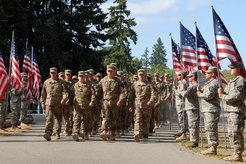Heroization through Socialization
Soldiers, War, and the U.S. Military in American History Textbooks (1965-1999)
Anna Borrero (completed PhD Project, 2020)

Of the 2.7 million US-soldiers returning home after having served in Vietnam, many reported enduring insults upon their arrival and dodging tomatoes, eggs or beer bottles. Many removed and disposed of their uniforms immediately, which was considered easier than facing the shame and humiliation that they symbolized. Today, soldiers returning home from duty in Afghanistan and Iraq return to airports filled with citizens anticipating their arrival, waving flags and grasping banners that read "Welcome Home Heroes".
The stark contrast between these two homecoming experiences illustrates a shift in the level of appreciation of soldiers in US-society. This is due to the fact that the moral standards applied to killing overseas have undergone changes characterized by an increased moralization of US involvement in war over time. Which social and political changes took place in the US following the Vietnam War that led to these changes in war discourse, thereby affecting the societal perception of soldiers?
In both the media and educational writing there exists a use of symbolism that is central to the construction and normalization of a coherent "we", the good, and "they", the evil enemy. The establishment of these "enemy" identities as threats to the nation requires not only the proliferation of their negative depiction, but also the propagation of a symbolically "good" identity with which citizens can identify (e.g. patriot, capitalist). The reinforcement of this hierarchical symbolic order and the nationalistic ideology that has worked to promote the "goodness" of US-American culture has become more visible throughout the last decades, especially following the attacks of 11 September 2001.
This project seeks to analyze this emotional transformation, arguing that it was a rhetoric change, attributable to increasingly nationalistic narratives found in education and media that have contributed to the moral justification of war, which in turn expresses itself in a greater appreciation of soldiers. This argument is illustrated through a culturalist discourse analysis of television and news media, political speeches and educational texts. The project takes up war narratives in the US from the Vietnam War up through today’s War on Terror and examines their increased reliance on exceptionalist and patriotic rhetoric.
